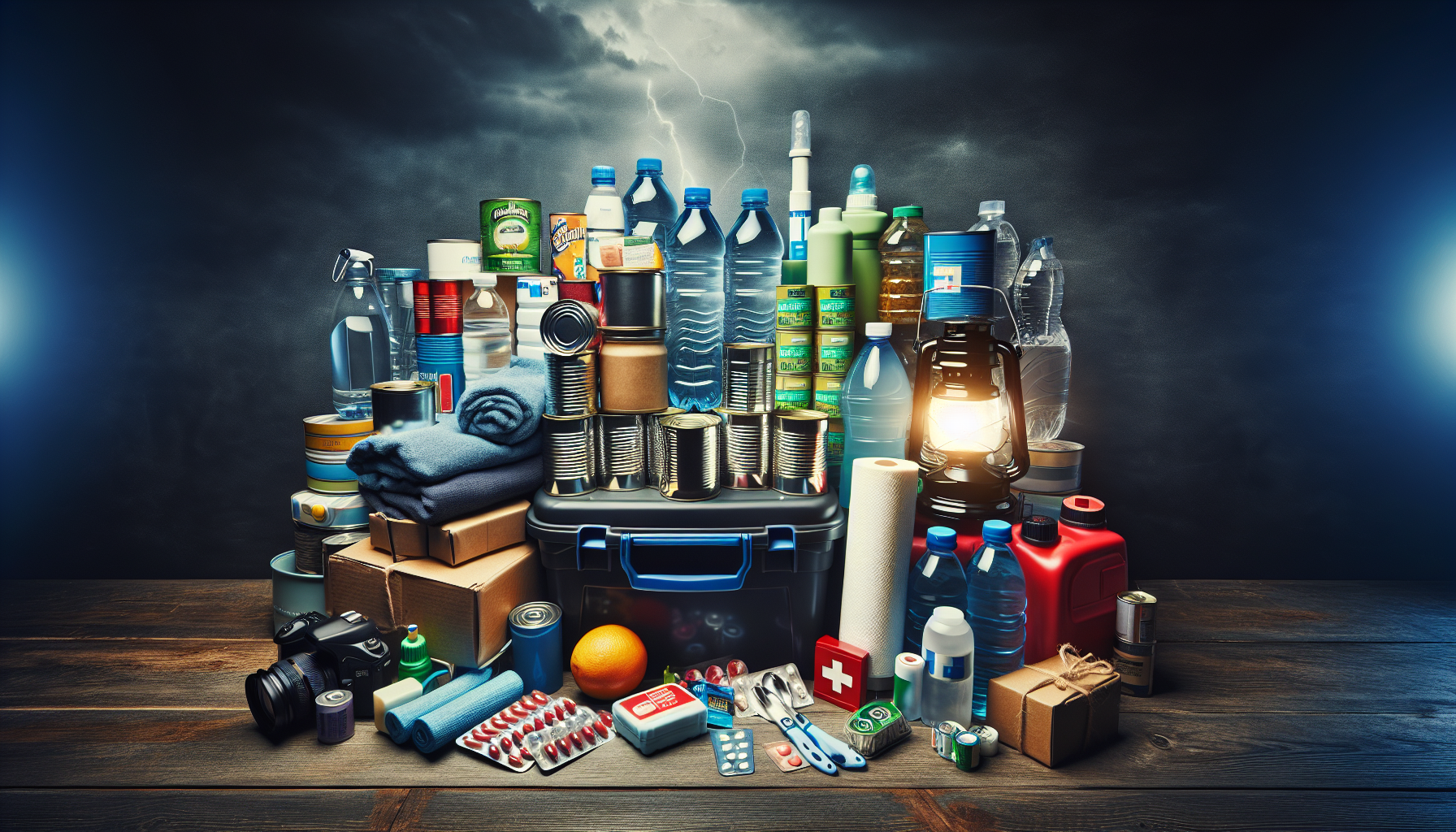In a world filled with uncertainties, it’s essential to be prepared for any eventuality. From natural disasters to economic crises, having a well-stocked supply of essential items can give you peace of mind and ensure your survival. But what exactly should you be stocking up on before a collapse? In this article, we’ll explore the must-have items that will help you weather the storm and emerge resilient in the face of adversity. Whether it’s food, water, or basic medical supplies, we’ve got you covered. So let’s get started on your journey to becoming a prepared and self-reliant individual.
Food
Non-perishable items
When preparing for a collapse or emergency situation, it is crucial to stock up on non-perishable food items. These are foods that can be stored for a long period without spoiling, ensuring that you have a reliable source of sustenance when fresh produce and refrigerated goods are no longer available. Some examples of non-perishable foods include canned goods, dried grains, and legumes.
Canned goods
Canned goods are versatile and can provide essential nutrients during challenging times. Stock up on a variety of canned goods such as vegetables, fruits, soups, and meats. These foods have a long shelf life and are packed with vitamins and minerals that your body needs to stay healthy. Plus, canned goods can be easily heated or eaten straight from the can, making them convenient for emergency situations.
Dried grains and legumes
Dried grains and legumes, such as rice, beans, lentils, and pasta, are excellent sources of carbohydrates and protein, making them ideal for your stockpile. These foods can be stored in airtight containers for extended periods, and they are known for their versatility, as they can be incorporated into various dishes. Make sure to store them in a cool, dry place to preserve their quality and taste.
Long-lasting fruits and vegetables
While it may not be possible to have an abundant supply of fresh fruits and vegetables during a collapse, there are options for long-lasting alternatives. Consider stocking up on dried fruits, freeze-dried vegetables, and dehydrated snacks. These can provide a much-needed dose of vitamins and minerals while adding variety to your meals. Additionally, investing in a home garden or learning about alternative methods of preserving fruits and vegetables can help sustain your food supply in the long run.
Powdered milk and formula
For families with infants or young children, powdered milk and formula are crucial items to include in your emergency stockpile. These products have a longer shelf life compared to fresh milk and can provide essential nutrients needed for a child’s growth and development. It is important to familiarize yourself with the proper preparation and storage of powdered milk or formula, ensuring your child’s health and well-being during challenging times.
Energy bars
Energy bars are compact, nutrient-dense snacks that can provide a quick boost of energy when needed. These bars are typically made with ingredients like nuts, dried fruits, and grains, offering a good balance of carbohydrates, proteins, and healthy fats. Energy bars are lightweight, making them ideal for situations where you might need to be on the move. Make sure to regularly check the expiration dates and rotate your stockpile to maintain freshness.
Water
Bottled water
Water is a fundamental resource for survival, and it is vital to have an ample supply before a collapse or emergency situation. Bottled water is an excellent choice for short-term storage as it is readily available and convenient to store. Aim to have at least one gallon of water per person per day for drinking and hygiene needs. Remember to check the expiration dates and store the bottles in a cool, dark place to maintain their quality.
Water purification tablets
In cases where your supply of bottled water runs out, having water purification tablets can be a lifesaver. These tablets are designed to disinfect and make water safe for consumption by eliminating harmful bacteria and viruses. They are compact, lightweight, and easy to use, making them a valuable addition to your emergency stockpile. It is essential to follow the instructions provided with the tablets to ensure a proper purification process.
Water filters
Water filters are another effective tool for providing clean and safe drinking water during a collapse. Investing in quality water filters, such as portable water filters or gravity-fed systems, can remove contaminants and make even questionable water sources suitable for consumption. While some filters require regular maintenance and replacement of filter cartridges, they offer a long-term solution for obtaining safe drinking water.
Water storage containers
Even if you have access to a clean water source, it is crucial to have proper storage containers to ensure its longevity and prevent contamination. Choose food-grade water storage containers that are durable, seal tight, and specifically designed for long-term water storage. These containers come in various sizes to suit your needs, and it is recommended to have enough capacity to store at least a two-week supply of water for each person in your household.
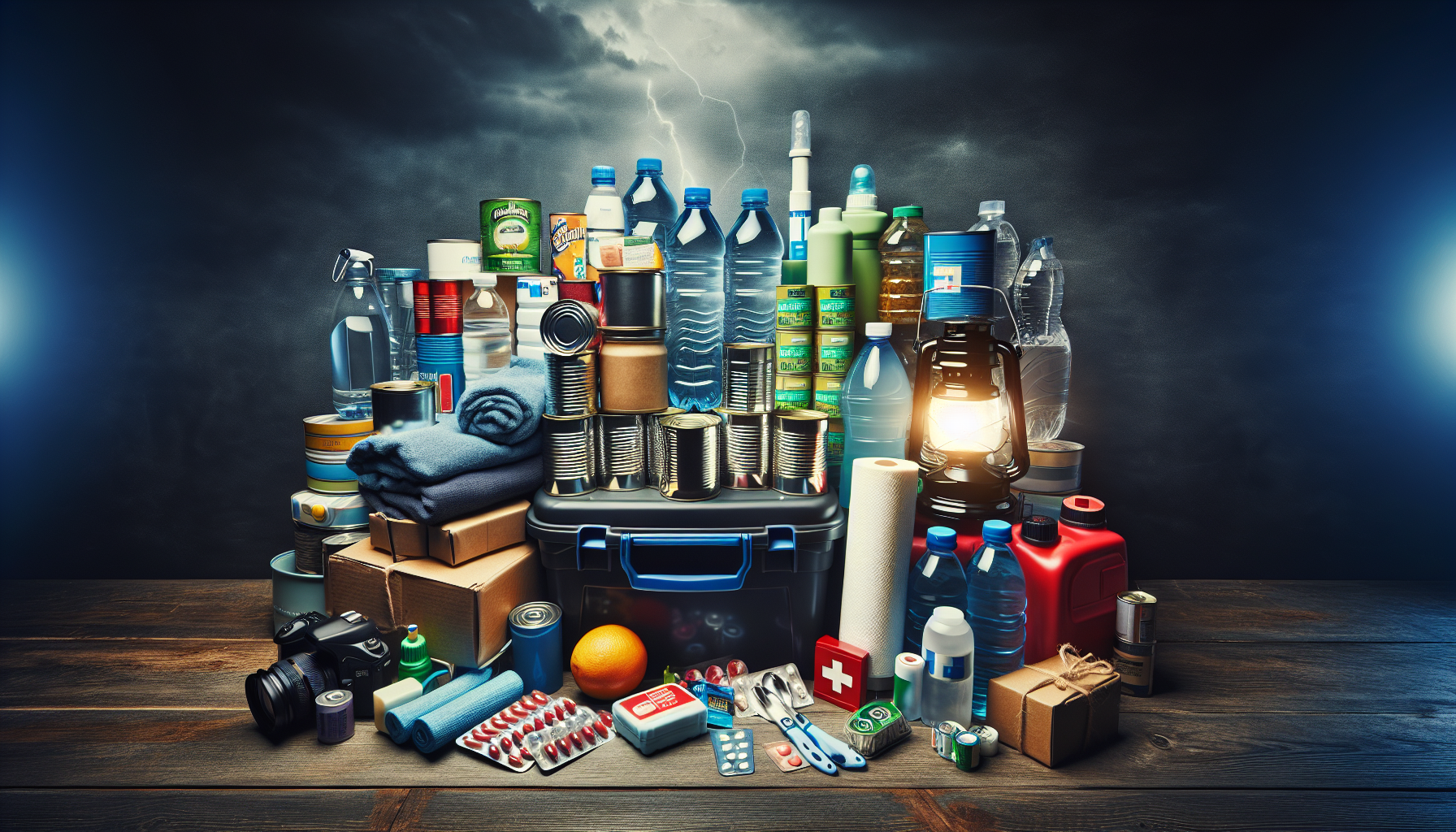
Medical Supplies
Prescription medications
If you or anyone in your family relies on prescription medications, it is essential to have an ample supply on hand before a collapse occurs. Contact your healthcare provider or pharmacist to discuss the possibility of receiving a larger prescription supply to include in your emergency stockpile. Rotate through your stockpile to ensure medications do not expire, and remember to store them in a cool, dry place to maintain their effectiveness.
First aid supplies
Accidents and injuries can happen at any time, and having a well-stocked first aid kit can make a significant difference in managing medical emergencies during a collapse. Ensure that your first aid kit includes items such as bandages, gauze, wound cleansers, adhesive tape, scissors, tweezers, and disposable gloves. It is also wise to have a thorough knowledge of basic first aid techniques to properly address common injuries.
Over-the-counter medicines
In addition to prescription medications, it is advisable to include a variety of over-the-counter medicines in your emergency supplies. Items like pain relievers, fever reducers, antihistamines, cold and flu medications, and stomach remedies can help alleviate symptoms and provide temporary relief during a collapse. Consider the specific needs of your family members when selecting these medicines and regularly check expiration dates.
Antibiotics
In certain collapse scenarios, access to medical professionals and antibiotics may be limited. As a result, having a supply of antibiotics specifically prescribed by a healthcare professional can be essential. It is crucial to consult with a healthcare provider beforehand to discuss the appropriate types and dosages of antibiotics to include in your stockpile. Keep in mind that antibiotics should only be used under proper medical guidance.
Medical equipment
Depending on individual medical needs, it may be necessary to include specific medical equipment in your stockpile. This could involve items such as blood pressure monitors, glucose monitors, insulin, inhalers, or any other equipment necessary to manage pre-existing conditions or chronic illnesses. Remember to regularly check and maintain the functionality of these devices to ensure proper usage when needed.
Sanitary items
Maintaining proper hygiene is crucial during a collapse to prevent the spread of illness and infection. Stock up on essential sanitary items such as disposable gloves, masks, hand sanitizers, antibacterial soaps, tissues, and garbage bags. These items will help you maintain a clean and hygienic environment when access to traditional sanitation facilities may be limited or unavailable.
Hygiene Products
Toilet paper
Toilet paper is an essential hygiene item that often goes unnoticed until it is no longer readily available. Make sure to stockpile an ample supply to meet your family’s needs for an extended period. Consider purchasing eco-friendly alternatives, such as bamboo toilet paper, which is more sustainable and biodegradable. Remember, hygiene and comfort are important factors in maintaining overall well-being during challenging times.
Soap and hand sanitizer
Proper hand hygiene is crucial, especially during times of uncertainty when access to clean water and traditional soap may be limited. Stock up on liquid hand soap, bar soap, and hand sanitizers to maintain cleanliness and prevent the spread of germs. Remember to prioritize products that contain at least 60% alcohol when selecting hand sanitizers for maximum effectiveness.
Toothpaste and toothbrushes
Oral hygiene should not be overlooked during emergency situations. Stockpile toothpaste and toothbrushes for each family member to ensure good oral health. Opt for toothpaste with a long shelf life, and consider using eco-friendly toothbrushes made from sustainable materials to minimize waste. Maintaining proper oral hygiene not only promotes physical health but also boosts morale during challenging times.
Feminine hygiene products
For individuals who menstruate, having an adequate supply of feminine hygiene products is essential to maintain dignity and comfort during a collapse. Stock up on menstrual pads, tampons, or menstrual cups, depending on personal preferences. It is recommended to have a variety of sizes and absorbencies to cater to different needs. Additionally, consider reusable options like period underwear or cloth pads for long-term sustainability.
Diapers and wipes
For families with infants or young children, ensuring an adequate supply of diapers and wipes is crucial for their comfort and hygiene. Stockpile diapers in various sizes to accommodate your child’s growing needs. It is worth considering reusable cloth diapers as an alternative to disposable diapers, as they can be washed and reused, reducing both waste and long-term costs. Additionally, stock up on baby wipes or consider making your own using safe, natural ingredients.
Shampoo and conditioner
Maintaining personal hygiene and cleanliness is vital for both physical and mental well-being. Stockpile shampoo and conditioner to ensure that you can continue practicing good hair care even during challenging times. Choose products with a long shelf life, and consider eco-friendly alternatives that are free from harmful chemicals. Prioritizing hygiene and overall self-care can help boost morale and maintain a sense of normalcy in times of distress.
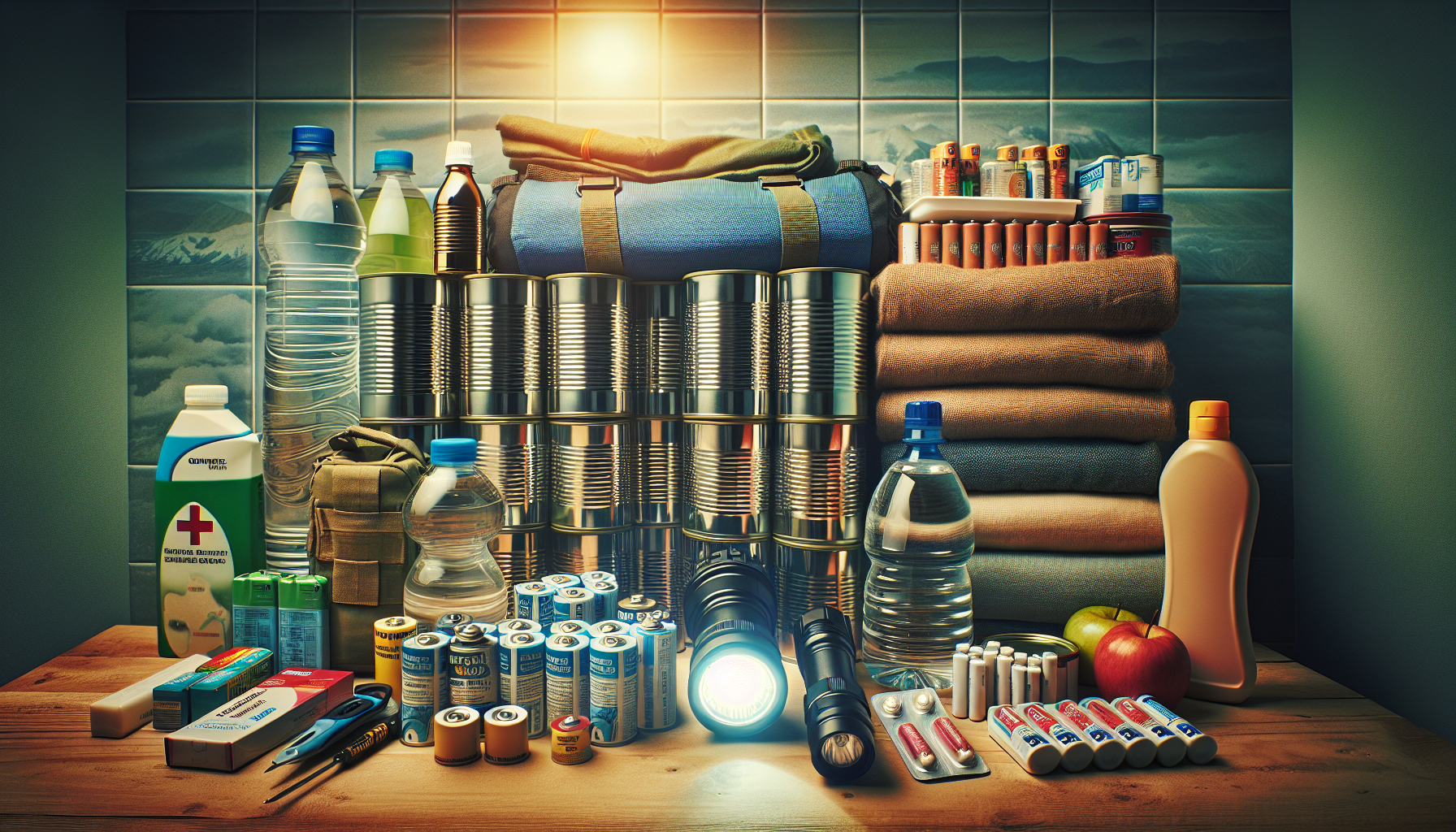
Power Sources
Batteries (various sizes)
In the event of a collapse or power outage, having a supply of batteries in various sizes can be crucial for powering essential devices and equipment. Stock up on batteries that are compatible with your flashlights, radios, and other battery-powered items. Remember to rotate your stockpile regularly to ensure that batteries do not lose their charge over time.
Portable generators
Portable generators are valuable backup power sources during a collapse, providing electricity for essential devices and appliances. Research and invest in a reliable portable generator that suits your needs and consider the fuel requirements and runtime capacity. It is essential to store fuel safely and maintain the generator regularly to ensure its functionality when needed.
Solar panels
Harnessing the power of the sun through solar panels can offer a sustainable and long-term solution for generating electricity during a collapse. Solar panels can be used to charge batteries, power small devices, or even provide electricity for lighting and basic appliances. Consider investing in portable solar panels and the necessary accessories to make the most of this renewable energy source.
Power banks
Power banks, also known as portable chargers, are compact batteries that can provide a convenient source of power for your electronic devices. These can be especially useful during a collapse when access to traditional power sources may be limited. Invest in power banks with a high capacity and multiple charging ports to keep your essential devices charged and operational.
Fuel
In addition to powering generators, fuel is also required for other items, such as vehicles, cooking stoves, or heating systems, depending on individual circumstances. Stockpile the appropriate type of fuel for your needs, such as gasoline, propane, kerosene, or firewood. Make sure to store fuel safely, following proper guidelines, to prevent accidents or degradation over time. Regularly rotate your fuel stockpile, using and replenishing it as necessary.
Fuel
Gasoline
Having an adequate supply of gasoline can be crucial during a collapse, especially if you rely on vehicles for transportation or generators for power. Store gasoline in approved containers in a well-ventilated area away from direct sunlight and ignition sources. It is advisable to rotate your gasoline stockpile regularly, using and replenishing it to prevent degradation and maintain freshness.
Propane
Propane is a versatile and efficient fuel source commonly used for cooking, heating, and powering portable appliances such as grills or camping stoves. Ensure you have an ample supply of propane cylinders or larger tanks depending on individual needs. Store propane tanks in a well-ventilated area, away from open flames or heat sources, and regularly check for leaks or damages.
Kerosene
Kerosene is another commonly used fuel for various purposes, such as heating, lighting, or cooking. If you rely on kerosene-powered appliances or lamps, it is essential to stockpile an adequate supply of kerosene. Choose containers specifically designed for kerosene storage, and store them in a cool, well-ventilated area to prevent evaporation or contamination. Remember to handle kerosene with care, as it is flammable and potentially hazardous.
Firewood
For those with access to a fireplace, wood-burning stove, or outdoor fire pit, stockpiling firewood can provide a source of heat and cooking during a collapse. Properly seasoned firewood, which is dry and free from excessive moisture, is essential for efficient burning and reducing smoke. Remember to store firewood in a dry place, preferably covered, to prevent moisture absorption and mold growth.
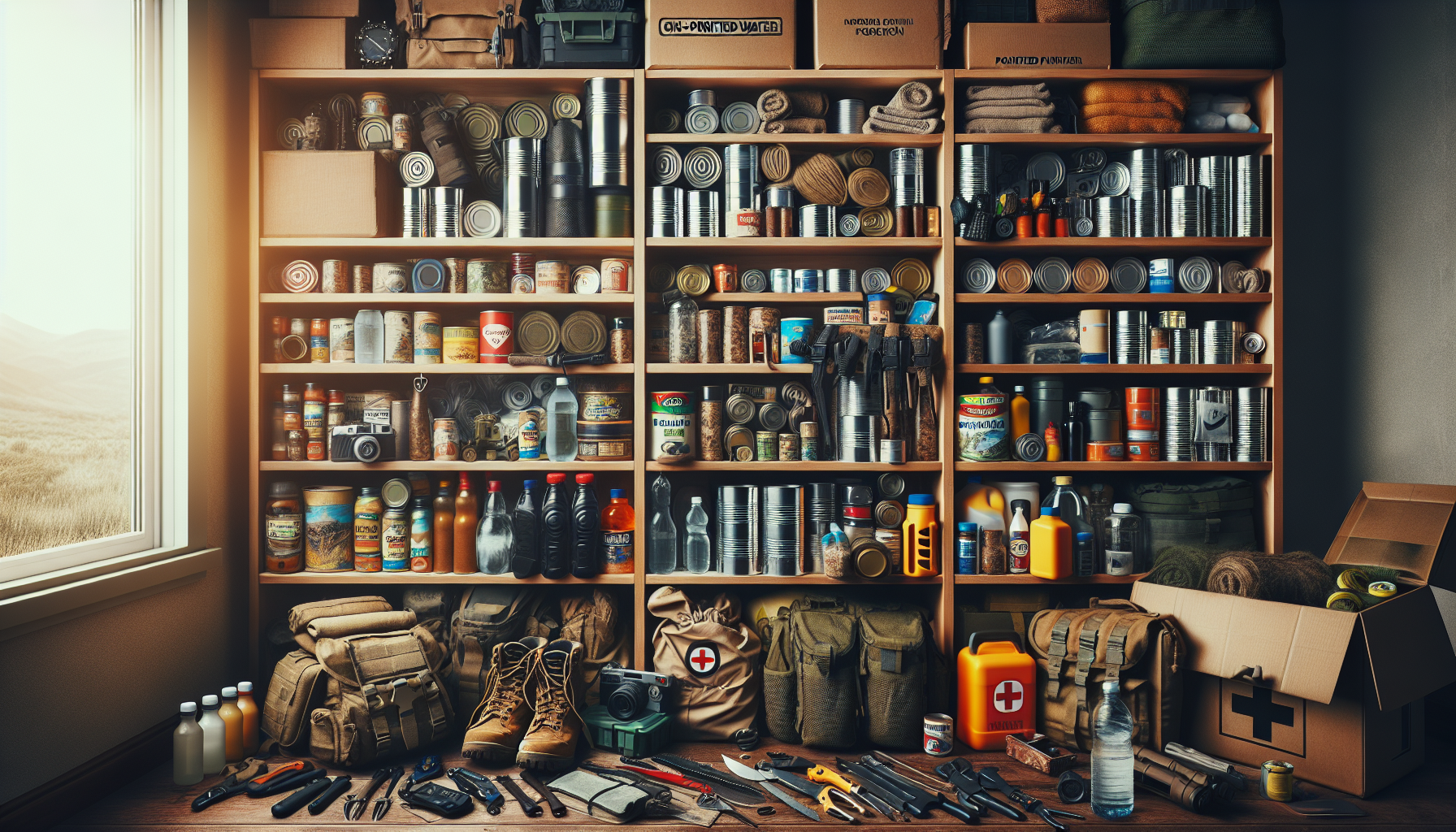
Defense
Firearms and ammunition
While it is not suitable or legal for everyone, those who are trained in firearm use and adhere to local laws regarding ownership and storage may choose to include firearms and ammunition in their emergency preparations. In the event that you feel firearms may be necessary for self-defense during a collapse, it is vital to receive appropriate training, securely store firearms, and adhere to all legal requirements.
Pepper spray
For individuals seeking non-lethal self-defense options, pepper spray can be an effective tool. Purchase pepper spray from reputable manufacturers, familiarize yourself with its proper usage, and store it in easily accessible locations. Pepper spray can provide a sense of security and serve as a deterrent during potentially dangerous situations.
Self-defense classes
Incorporating self-defense training into your preparations can provide you with valuable skills and confidence in dealing with various scenarios. Seek out professional self-defense classes or workshops that focus on situational awareness, basic self-defense techniques, and conflict de-escalation skills. Investing time and effort in learning self-defense can significantly enhance your personal safety and peace of mind.
Escape plan
While it is essential to focus on stocking up and preparing for a collapse, having an escape plan in place is equally important. Sit down with your family members and discuss various exit strategies, safe meeting points, and emergency contacts. Familiarize yourself with evacuation routes and make sure to include essential items, such as a go-bag containing important documents, cash, and valuables, in your escape plan.
Communication
Walkie-talkies
In the absence of reliable cellular networks or landline telephones during a collapse, walkie-talkies can prove to be invaluable for communication. Purchase a set of quality walkie-talkies with a long range and battery life, ensuring that you are able to maintain contact with family members or trusted neighbors. Familiarize yourself with frequency channels and ensure that all individuals using walkie-talkies are on the same frequency for effective communication.
Two-way radios
Two-way radios offer a reliable means of wireless communication over a longer distance, making them useful for both short-range and long-range communication. Invest in two-way radios that are durable, have a clear signal, and offer multiple channels. Keep extra batteries or compatible rechargeable battery packs to ensure continuous communication throughout the duration of a collapse.
Portable ham radios
Ham radios, also known as amateur radios, can provide communication capabilities beyond what is available with walkie-talkies or two-way radios. These radios require a license to operate but offer greater range and access to dedicated frequencies for emergency communication. Consider obtaining the necessary license and training to operate a portable ham radio effectively during times of crisis.
Solar-powered chargers
In situations where traditional power sources are scarce, having solar-powered chargers for your electronic devices can ensure that you stay connected. Solar chargers convert sunlight into electricity, allowing you to recharge essential devices such as smartphones, tablets, or radios. Opt for lightweight and portable solar chargers that are compatible with your devices, and ensure they have a sufficient charging capacity for efficient use.
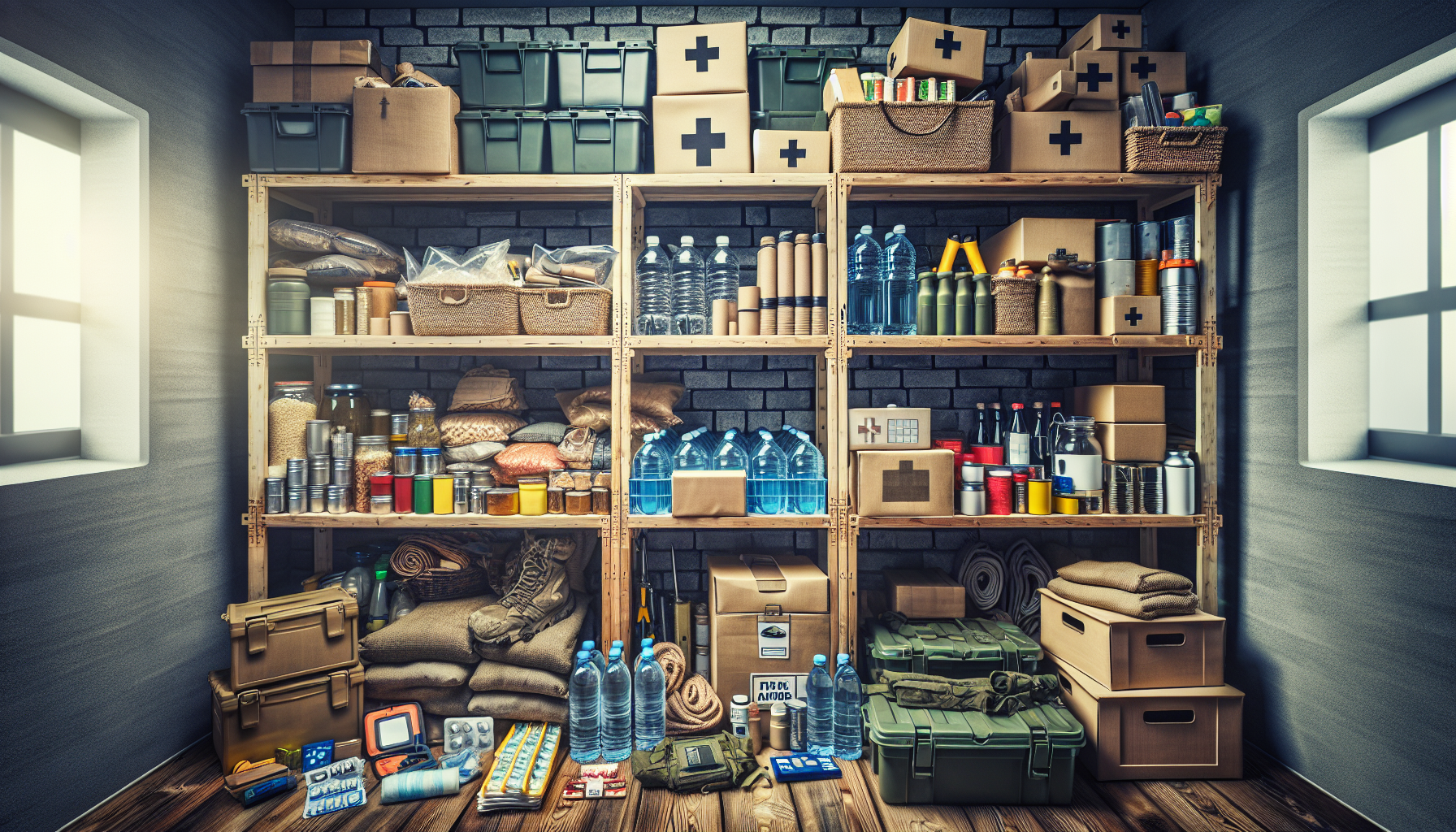
Tools and Supplies
Multi-purpose tools
Having a reliable multi-purpose tool, such as a Swiss Army knife or a multi-tool, is essential for various tasks during a collapse. These tools often include a combination of knives, pliers, screwdrivers, scissors, and other useful features. Invest in a high-quality multi-purpose tool that suits your needs and consider having multiple tools for different family members or locations.
Flashlights and lanterns
When the power goes out during a collapse, having a reliable source of lighting becomes crucial. Stock up on flashlights and lanterns, ensuring that you have enough for each family member. Opt for LED flashlights, as they are energy-efficient and provide a longer battery life. Consider including extra batteries or rechargeable battery options to ensure continuous illumination.
Duct tape
Duct tape is known for its versatility and durability, making it an essential item to have in your toolkit. It can serve multiple purposes, from temporary repairs to creating makeshift shelters or fixing broken equipment. Stock up on rolls of duct tape in various widths, ensuring that you have enough to tackle unexpected situations during a collapse.
Rope
Rope is another versatile tool that can come in handy during emergency situations. From setting up shelters to securing items or creating makeshift tools, having a sturdy and reliable rope is essential. Choose ropes made from durable and weather-resistant materials, such as nylon or polypropylene, and have different lengths and thicknesses to accommodate various needs.
Candles and matches
When traditional lighting options are not available, candles can provide a reliable source of illumination during a collapse. Stock up on both emergency and long-lasting candles, ensuring that you have enough to last for an extended period. Remember to store candles in a cool, dry place to prevent melting or loss of quality. Additionally, include a supply of matches or lighters to ensure you can light the candles when needed.
Cookware and utensils
Having appropriate cookware and utensils is essential for preparing meals during a collapse. Invest in durable, portable cookware that can be used over open fires or camping stoves. Consider items such as pots, pans, mess kits, cutlery, and reusable food storage containers. Ideally, choose cookware that is lightweight and easy to clean to facilitate meal preparation and minimize resource usage.
Cleaning supplies
Maintaining cleanliness and sanitation during a collapse is crucial for preventing the spread of diseases and maintaining overall well-being. Stock up on cleaning supplies such as disinfectant wipes, bleach, laundry detergent, dish soap, and hand brushes to ensure hygienic conditions. Prioritize products that are effective against a wide range of viruses and bacteria. Regularly clean and disinfect surfaces, utensils, and other items to minimize the risk of contamination.
Cash and Valuables
Cash (small bills)
In emergency situations, access to banking systems or ATMs may become limited, and electronic payment methods may not be reliable. It is advisable to keep a supply of cash in small bills for potential use during a collapse. Having cash on hand can help cover immediate expenses, purchase essential items, or facilitate exchanges in case of disrupted services or trade.
Gold and silver
Consider diversifying your assets by including gold and silver in your emergency preparations. Precious metals can serve as a form of currency and store of value during challenging times. However, it is essential to research and consult with reputable sources or financial advisors to make informed decisions regarding the purchase, storage, and potential liquidation of gold and silver.
Important documents
Gather and safeguard important documents such as identification papers, passports, birth certificates, marriage certificates, insurance policies, medical records, and property deeds. Keep these documents in a waterproof and fireproof container to ensure their protection in the event of a collapse or natural disaster. Make digital copies of these documents and store them securely in password-protected digital storage or cloud services.
Photos and memories
Photographs and personal mementos can provide comfort and a sense of normalcy during times of uncertainty. Consider preserving and storing printed photographs or sentimental items that hold significant emotional value to you and your family. Having these reminders of happier times can boost morale and help maintain a sense of connection to your past and loved ones.
In conclusion, preparing for a collapse or emergency situation requires careful consideration of various factors. By focusing on key areas such as food, water, medical supplies, hygiene products, power sources, defense, communication, tools and supplies, and cash and valuables, you can build a comprehensive emergency stockpile that addresses your essential needs. Remember to regularly evaluate and rotate your stockpile to maintain freshness, check expiration dates, and ensure that you have the necessary skills and knowledge to make the most of your preparations. Stay proactive, informed, and prepared to increase your chances of weathering uncertain times with resilience and adaptability.
